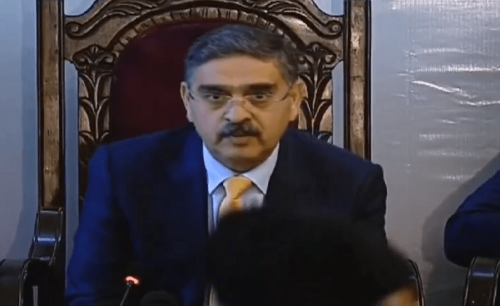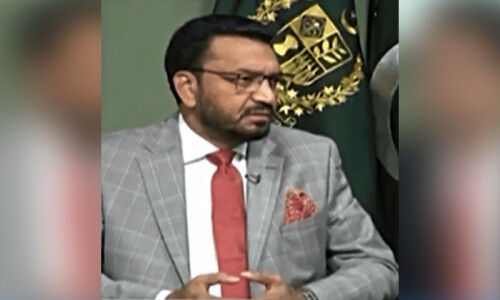Caretaker Prime Minister Anwaarul Haq Kakar’s outburst against Baloch protesters, who have been camped out in Islamabad, has struck a nerve — both among his supporters and critics.
“It is not something new he has said about Balochistan… it may be new for the rest of the country,” says Asif Baloch, who is editor of the daily Azaadi, an Urdu language newspaper in Quetta.
Indeed, there are many in the province who believe that his words on Balochistan’s missing persons’ issue were quite calculated, well thought out, and planned.
Mr Kakar’s view on the issue has been consistent, at least since his tenure as the spokesman for former chief minister Nawab Sanaullah Zehri in 2015.
In a column about his first meeting with Mr Kakar during a seminar on Balochistan in Quetta, noted journalist Zahid Hussain recalled: “He vehemently disputed my assertion on missing persons. ‘Why do you only talk about missing persons?’ he asked, in front of the military top brass sitting in the front row.”
These views are not unique to Mr Kakar, either. There are many in the Balochistan hierarchy who share his stance on the issue.
Jan Achakzai, the incumbent caretaker information minister for the province, also fully endorsed the caretaker prime minister’s words.
“His statement is straight and candid… none [of the politicians] can challenge the militants in Balochistan who kill innocent people, while [PM Kakar] challenged them, nor his stance is vexed,” he told Dawn on Tuesday.
“His stance is not compromised, and he is not using it for a power grab. What he feels, he says it,” said Mr Achakzai, who is also known for his hawkish views.
Professor Mumtaz Baloch, who teaches political science at the University of Balochistan, told Dawn that as the prime minister, Mr Kakar should avoid making such inflammatory remarks.
“He is now the representative of the nation, as well as having the highest position in the land,” he told Dawn.
“It is said that the state is like a mother,” he says, paraphrasing an oft-used term in Urdu. “If a citizen asks a question, [those in power] should respond affectionately, instead of giving harsh statements, which are tantamount to cornering the marginalised. That is detrimental to the state itself.”
In Balochistan and elsewhere in the country, the missing persons’ issue has been a major bone of contention between citizens and the state apparatus.
Even Chief Justice Qazi Faez Isa, in his observations during Tuesday’s hearing at the Supreme Court, noted that the issue was a genuine one. “This country belongs to all of us, even those who may have other points of view. This matter will only be resolved when we all work together and take responsibility,” he observed.
For those affected by the issue, such as the families of those who have been missing for many years and months, the prime minister’s words have come as a major blow.
For instance, the story of Dr Deen Muhammad Baloch, a Baloch physician and politician who has been missing for 14 years, is a case study in enforced disappearances.
His daughter, Sammi, has been campaigning for his return since she was a young girl of 10, being a permanent fixture at sit-ins, hunger strikes and other demonstrations in Quetta and other parts of Balochistan.
At the age of 15, in 2014, she participated in the Voice of Baloch Missing Persons march to Islamabad. Now, as an adult, she is one of those at the forefront of the sit-in currently being held in Islamabad. However, the young Baloch girl has yet to get any sort of closure.
“Two things matter: policies and behaviour,” says Mumtaz Baloch. “Through good policies and behaviour, the state or its leaders can resolve the people’s issues. If the state of Pakistan… acts in the light of the 1973 Constitution to resolve the genuine issues of its people, including those from Balochistan, it can make a difference and pave the way for a peaceful environment in the country.”
But such inflammatory statements do not suit a prime minister, let alone the caretaker one as the province he is talking about has already been bereft of peace for over 20 years “due to such attitudes”, says Quetta-based analyst Jalal Noorzai.
“Balochistan’s issues, which are political in nature, have to be dealt with through dialogue and the door of negotiations should always remain open, particularly at a time when there is a caretaker setup mandated to hold elections in the country,” he says.
In the immediate aftermath of the prime minister’s outburst, human rights activists and members of civil society roundly denounced his “insensitive, provocative” remarks.
In a statement issued on Tuesday, former senator Farhatullah Babar said the prime minister should have “sought to put balm on the wounds of the people” since he himself hailed from Balochistan, but instead, “chose… to rub salt into the wounds of the people of the province. This is most unfortunate and condemnable.”
Lawyer and rights activist Imaan Zainab Mazari-Hazir also said Mr Kakar’s “irresponsible and provocative statements” had no intent other than to “push peaceful people to take up arms against any form of injustice”.
Published in Dawn, January 3rd, 2024















































Dear visitor, the comments section is undergoing an overhaul and will return soon.